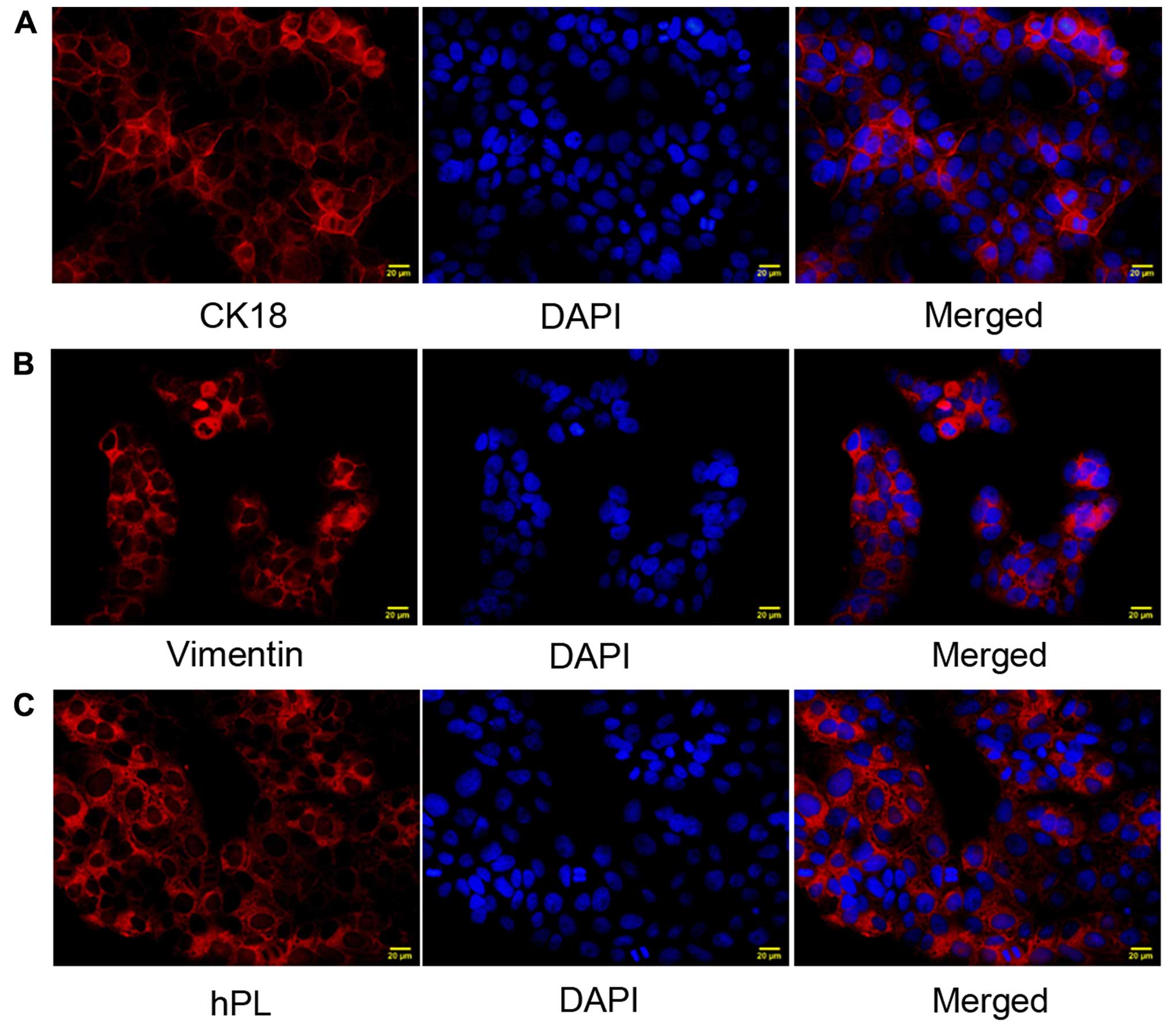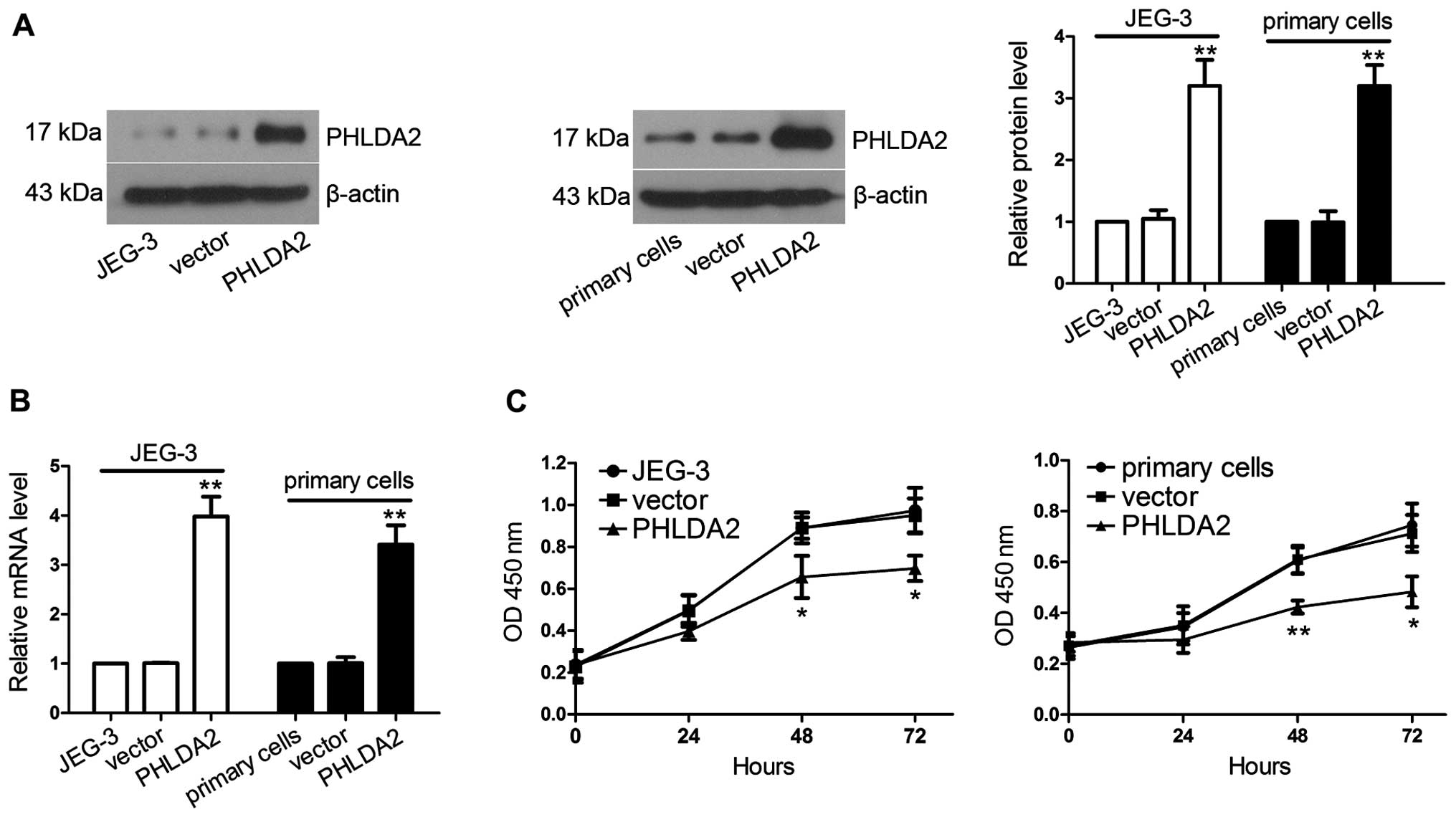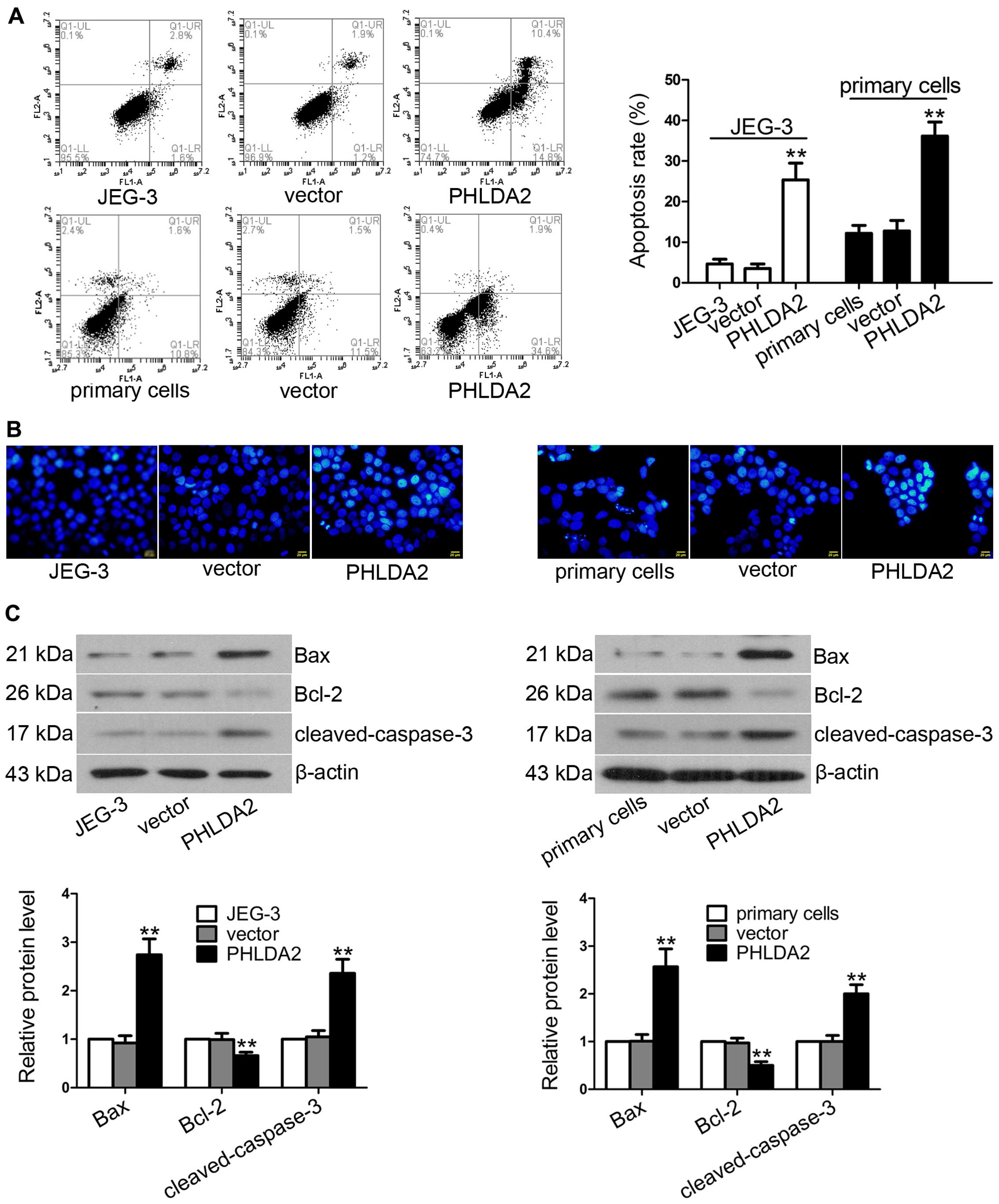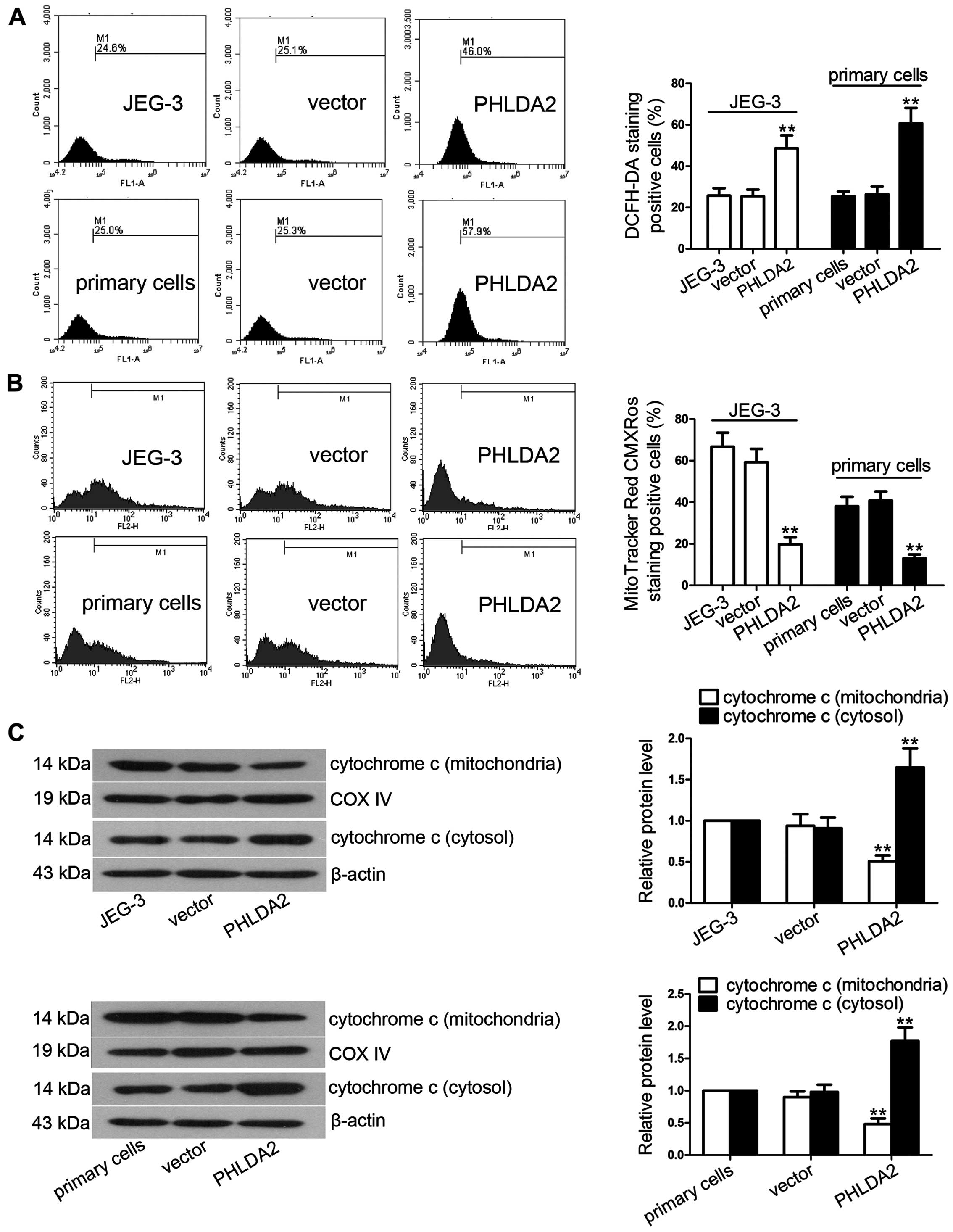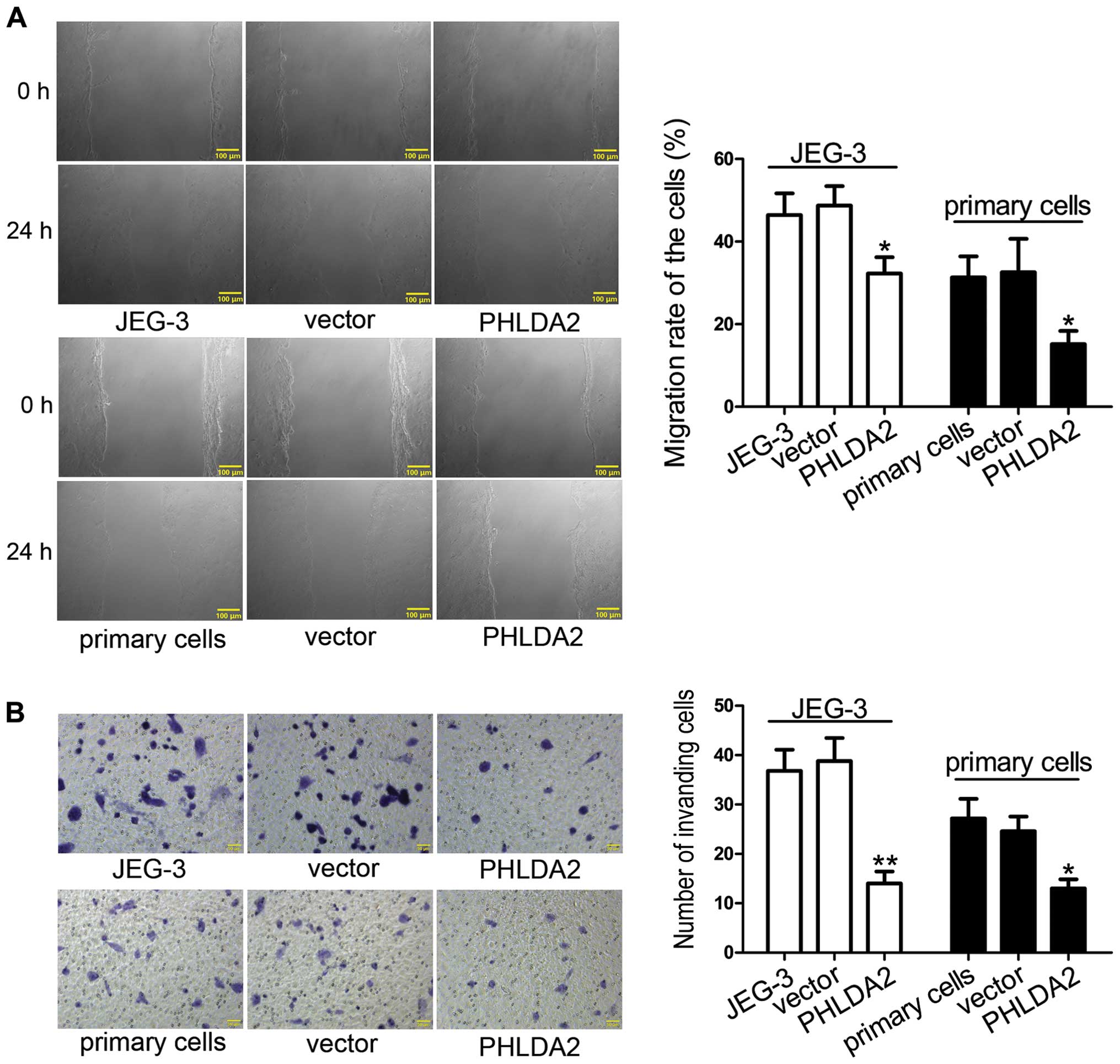|
1
|
Cha J, Sun X and Dey SK: Mechanisms of
implantation: strategies for successful pregnancy. Nat Med.
18:1754–1767. 2012. View
Article : Google Scholar : PubMed/NCBI
|
|
2
|
Garnica AD and Chan WY: The role of the
placenta in fetal nutrition and growth. J Am Coll Nutr. 15:206–222.
1996. View Article : Google Scholar : PubMed/NCBI
|
|
3
|
Nagashima T, Li Q, Clementi C, Lydon JP,
DeMayo FJ and Matzuk MM: BMPR2 is required for postimplantation
uterine function and pregnancy maintenance. J Clin Invest.
123:2539–2550. 2013. View
Article : Google Scholar : PubMed/NCBI
|
|
4
|
Romero R, Kusanovic JP, Chaiworapongsa T
and Hassan SS: Placental bed disorders in preterm labor, preterm
PROM, spontaneous abortion and abruptio placentae. Best Pract Res
Clin Obstet Gynaecol. 25:313–327. 2011. View Article : Google Scholar : PubMed/NCBI
|
|
5
|
Whitley GS, Dash PR, Ayling LJ, Prefumo F,
Thilaganathan B and Cartwright JE: Increased apoptosis in first
trimester extravillous trophoblasts from pregnancies at higher risk
of developing preeclampsia. Am J Pathol. 170:1903–1909. 2007.
View Article : Google Scholar : PubMed/NCBI
|
|
6
|
Valenzuela FJ, Vera J, Venegas C, Pino F
and Lagunas C: Circadian system and melatonin hormone: risk factors
for complications during pregnancy. Obstet Gynecol Int.
2015(825802)2015. View Article : Google Scholar : PubMed/NCBI
|
|
7
|
Khong Y and Brosens I: Defective deep
placentation. Best Pract Res Clin Obstet Gynaecol. 25:301–311.
2011. View Article : Google Scholar
|
|
8
|
Huang Y, Dong F, Du Q, Zhang H, Luo X,
Song X, Zhao X, Zhang W and Tong D: Swainsonine induces apoptosis
through mitochondrial pathway and caspase activation in goat
trophoblasts. Int J Biol Sci. 10:789–797. 2014. View Article : Google Scholar : PubMed/NCBI
|
|
9
|
Qian N, Frank D, O'Keefe D, Dao D, Zhao L,
Yuan L, Wang Q, Keating M, Walsh C and Tycko B: The IPL gene on
chromosome 11p15.5 is imprinted in humans and mice and is similar
to TDAG51, implicated in Fas expression and apoptosis. Hum Mol
Genet. 6:2021–2029. 1997. View Article : Google Scholar : PubMed/NCBI
|
|
10
|
McMinn J, Wei M, Schupf N, Cusmai J,
Johnson EB, Smith AC, Weksberg R, Thaker HM and Tycko B: Unbalanced
placental expression of imprinted genes in human intrauterine
growth restriction. Placenta. 27:540–549. 2006. View Article : Google Scholar
|
|
11
|
Jensen AB, Tunster SJ and John RM: The
significance of elevated placental PHLDA2 in human growth
restricted pregnancies. Placenta. 35:528–532. 2014. View Article : Google Scholar : PubMed/NCBI
|
|
12
|
Apostolidou S, Abu-Amero S, O'Donoghue K,
Frost J, Olafsdottir O, Chavele KM, Whittaker JC, Loughna P,
Stanier P and Moore GE: Elevated placental expression of the
imprinted PHLDA2 gene is associated with low birth weight. J Mol
Med Berl. 85:379–387. 2007. View Article : Google Scholar
|
|
13
|
Tunster SJ, Van De Pette M and John RM:
Isolating the role of elevated Phlda2 in asymmetric late fetal
growth restriction in mice. Dis Model Mech. 7:1185–1191. 2014.
View Article : Google Scholar : PubMed/NCBI
|
|
14
|
Kumar N, Leverence J, Bick D and Sampath
V: Ontogeny of growth-regulating genes in the placenta. Placenta.
33:94–99. 2012. View Article : Google Scholar
|
|
15
|
Diplas AI, Lambertini L, Lee MJ, Sperling
R, Lee YL, Wetmur J and Chen J: Differential expression of
imprinted genes in normal and IUGR human placentas. Epigenetics.
4:235–240. 2009. View
Article : Google Scholar : PubMed/NCBI
|
|
16
|
Frank D, Fortino W, Clark L, Musalo R,
Wang W, Saxena A, Li CM, Reik W, Ludwig T and Tycko B: Placental
overgrowth in mice lacking the imprinted gene Ipl. Proc Natl Acad
Sci USA. 99:7490–7495. 2002. View Article : Google Scholar : PubMed/NCBI
|
|
17
|
Driver AM, Huang W, Kropp J, Peñagaricano
F and Khatib H: Knockdown of CDKN1C (p57(kip2)) and PHLDA2 results
in developmental changes in bovine pre-implantation embryos. PLoS
One. 8:e694902013. View Article : Google Scholar : PubMed/NCBI
|
|
18
|
Livak KJ and Schmittgen TD: Analysis of
relative gene expression data using real-time quantitative PCR and
the 2(-Delta Delta C(T)) method. Methods. 25:402–408. 2001.
View Article : Google Scholar
|
|
19
|
Demetriou C, Abu-Amero S, Thomas AC,
Ishida M, Aggarwal R, Al-Olabi L, Leon LJ, Stafford JL, Syngelaki
A, Peebles D, et al: Paternally expressed, imprinted insulin-like
growth factor-2 in chorionic villi correlates significantly with
birth weight. PLoS One. 9:e854542014. View Article : Google Scholar : PubMed/NCBI
|
|
20
|
Zhang L, Zhang W, Shao C, Zhang J, Men K,
Shao Z, Yan Y and Xu D: Establishment and characterization of a
spontaneously immortalized trophoblast cell line (HPT-8) and its
hepatitis B virus-expressing clone. Hum Reprod. 26:2146–2156. 2011.
View Article : Google Scholar : PubMed/NCBI
|
|
21
|
Aboagye-Mathiesen G, Laugesen J,
Zdravkovic M and Ebbesen P: Isolation and characterization of human
placental trophoblast subpopulations from first-trimester chorionic
villi. Clin Diagn Lab Immunol. 3:14–22. 1996.PubMed/NCBI
|
|
22
|
Liu Z, Lu H, Jiang Z, Pastuszyn A and Hu
CA: Apolipoprotein l6, a novel proapoptotic Bcl-2 homology 3-only
protein, induces mitochondria-mediated apoptosis in cancer cells.
Mol Cancer Res. 3:21–31. 2005.PubMed/NCBI
|
|
23
|
Brinkmann K and Kashkar H: Targeting the
mitochondrial apoptotic pathway: a preferred approach in
hematologic malignancies? Cell Death Dis. 5:e10982014. View Article : Google Scholar : PubMed/NCBI
|
|
24
|
Green DR and Kroemer G: The
pathophysiology of mitochondrial cell death. Science. 305:626–629.
2004. View Article : Google Scholar : PubMed/NCBI
|
|
25
|
Adams JM and Cory S: The Bcl-2 apoptotic
switch in cancer development and therapy. Oncogene. 26:1324–1337.
2007. View Article : Google Scholar : PubMed/NCBI
|
|
26
|
Hardwick JM and Soane L: Multiple
functions of BCL-2 family proteins. Cold Spring Harb Perspect Biol.
5(5)2013. View Article : Google Scholar : PubMed/NCBI
|
|
27
|
Dai H, Huang Y, Li Y, Meng G, Wang Y and
Guo QN: TSSC3 overexpression associates with growth inhibition,
apoptosis induction and enhances chemotherapeutic effects in human
osteosarcoma. Carcinogenesis. 33:30–40. 2012. View Article : Google Scholar
|
|
28
|
Xu Q, Zhang B, Li XM and Gao X:
Traditional Chinese medicine formula Qing Huo Yi Hao as superoxide
anion scavenger in high glucose-treated endothelial cells. Acta
Pharmacol Sin. 33:496–502. 2012. View Article : Google Scholar : PubMed/NCBI
|
|
29
|
Circu ML and Aw TY: Reactive oxygen
species, cellular redox systems, and apoptosis. Free Radic Biol
Med. 48:749–762. 2010. View Article : Google Scholar : PubMed/NCBI
|
|
30
|
Zorov DB, Juhaszova M and Sollott SJ:
Mitochondrial ROS-induced ROS release: an update and review.
Biochim Biophys Acta. 1757:509–517. 2006. View Article : Google Scholar : PubMed/NCBI
|
|
31
|
Huang Y, Dai H and Guo QN: TSSC3
overexpression reduces stemness and induces apoptosis of
osteosarcoma tumor-initiating cells. Apoptosis. 17:749–761. 2012.
View Article : Google Scholar : PubMed/NCBI
|
|
32
|
Pijnenborg R, Robertson WB, Brosens I and
Dixon G: Review article: trophoblast invasion and the establishment
of haemochorial placentation in man and laboratory animals.
Placenta. 2:71–91. 1981. View Article : Google Scholar : PubMed/NCBI
|
|
33
|
Aplin JD: Implantation, trophoblast
differentiation and haemochorial placentation: mechanistic evidence
in vivo and in vitro. J Cell Sci. 99:681–692. 1991.PubMed/NCBI
|
|
34
|
Bischof P, Meisser A and Campana A:
Biochemistry and molecular biology of trophoblast invasion. Ann N Y
Acad Sci. 943:157–162. 2001. View Article : Google Scholar : PubMed/NCBI
|
|
35
|
Tapia-Pizarro A, Argandoña F, Palomino WA
and Devoto L: Human chorionic gonadotropin (hCG) modulation of
TIMP1 secretion by human endometrial stromal cells facilitates
extravillous trophoblast invasion in vitro. Hum Reprod.
28:2215–2227. 2013. View Article : Google Scholar : PubMed/NCBI
|
|
36
|
Yang Q, Chen SP, Zhang XP, Wang H, Zhu C
and Lin HY: Smurf2 participates in human trophoblast cell invasion
by inhibiting TGF-beta type I receptor. J Histochem Cytochem.
57:605–612. 2009. View Article : Google Scholar : PubMed/NCBI
|
|
37
|
Lim KH, Zhou Y, Janatpour M, McMaster M,
Bass K, Chun SH and Fisher SJ: Human cytotrophoblast
differentiation/invasion is abnormal in pre-eclampsia. Am J Pathol.
151:1809–1818. 1997.PubMed/NCBI
|
|
38
|
George EM and Granger JP: Recent insights
into the pathophysiology of preeclampsia. Expert Rev Obstet
Gynecol. 5:557–566. 2010. View Article : Google Scholar : PubMed/NCBI
|
|
39
|
Salas M, John R, Saxena A, Barton S, Frank
D, Fitzpatrick G, Higgins MJ and Tycko B: Placental growth
retardation due to loss of imprinting of Phlda2. Mech Dev.
121:1199–1210. 2004. View Article : Google Scholar : PubMed/NCBI
|















